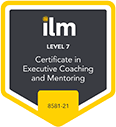
Coaching and mentoring
What is executive coaching and mentoring?
What is coaching?
The International Coaching Federation (ICF) defines coaching as partnering in a thought-provoking and creative process to maximize personal and professional potential. Whitmore describes it as a belief in the capability, resourcefulness and potential of others. This allows to focus on strengths, solutions, and future success, not weakness, problems, or past performance. Coaching is unlocking people’s potential to maximize their own performance. It helps them to learn rather than teaching them. Coaching is a conversation between equals based on trust, belief, and non-judgement. The most effective coaching allows for collaboration to assess and understand the development task. It challenges limiting beliefs and explores possibilities. It is to ensure accountability and support for reaching goals and sustaining development. A coach is not a problem solver, a counselor, a teacher, an adviser, and instructor, or even an expert. A coach is a sounding board, a facilitator, an awareness raiser, a supporter.
Role of a Coach
An effective executive coach is a specialist in facilitating the development of skills and behaviours of their client. A coach has a balancing act to perform in providing a structure to discuss development issues and enable insight and reflective learning. At the same time coach needs to allow the client to retain control of the process. Introducing models, concepts, feedback, and competency frameworks are all useful tools for stimulating the thinking, reflection, and reflective learning of the client. At the core of coaching is art of supporting a client’s learning through reflection and self-discovery. The coach has a range of tools and processes to use with clients. This provides frameworks for their thinking and the opportunity to learn from reflection. It also helps innovate solutions to current and future issues.
What is executive coaching and mentoring?
What is Mentoring?
Mentoring on the other hand is a committed, long-term relationship associated with the where mentor and mentee share the same profession or business. There is more guidance and influence than in coaching. It may be bound by a formal contract or much more informal in process as opposed to coaching where contracting is key for its effectiveness. The CIPD describes it as: entailing broader ranging, longer term conversations. It is dictated more by mentee’s needs for future career development than specific issues in present job. Mentor is using their industry/sector experience to guide mentee’s professional development. This means that the mentoring is less about focused behaviour change like in coaching. And more about helping the mentee to construct a bigger picture that will animate their future career.
The boundaries between coaching and mentoring activities are clearer when one looks at their different processes and outcomes. Where it becomes fuzzy is in real life coaching situations where many of the executives have variety of needs that not necessarily fit neatly into one side of the equation or the other. In such moments it is key to recognise and acknowledge with the client that a ‘boundary’ is being crossed. In my professional experience I jointly agree with a client on the differences between the two and ask permission to be sure that the client is interested in specific relevant advice when crossing into mentoring territory. An experienced coach knows when to use mentoring instead of coaching and asking for permission also helps keep clarity of whose responsibility is it to solve problems.
Difference between life coaching and executive coaching
What is Life Coaching?
A collaborative solution-focused, results-oriented and systematic process in which the coach facilitates the enhancement of work performance, life experience, self-directed learning and personal growth of the client.
For life coaching packages follow this link.
What is Executive Coaching?
Executive coaching is about using coaching as an approach for developing capability and performance in the work context. As an Executive Coach I come from a management development training background. Effective coaching is very good at influencing changes in management and leadership behaviours, confidence and work performance.
For leadership executive packages follow this link.




